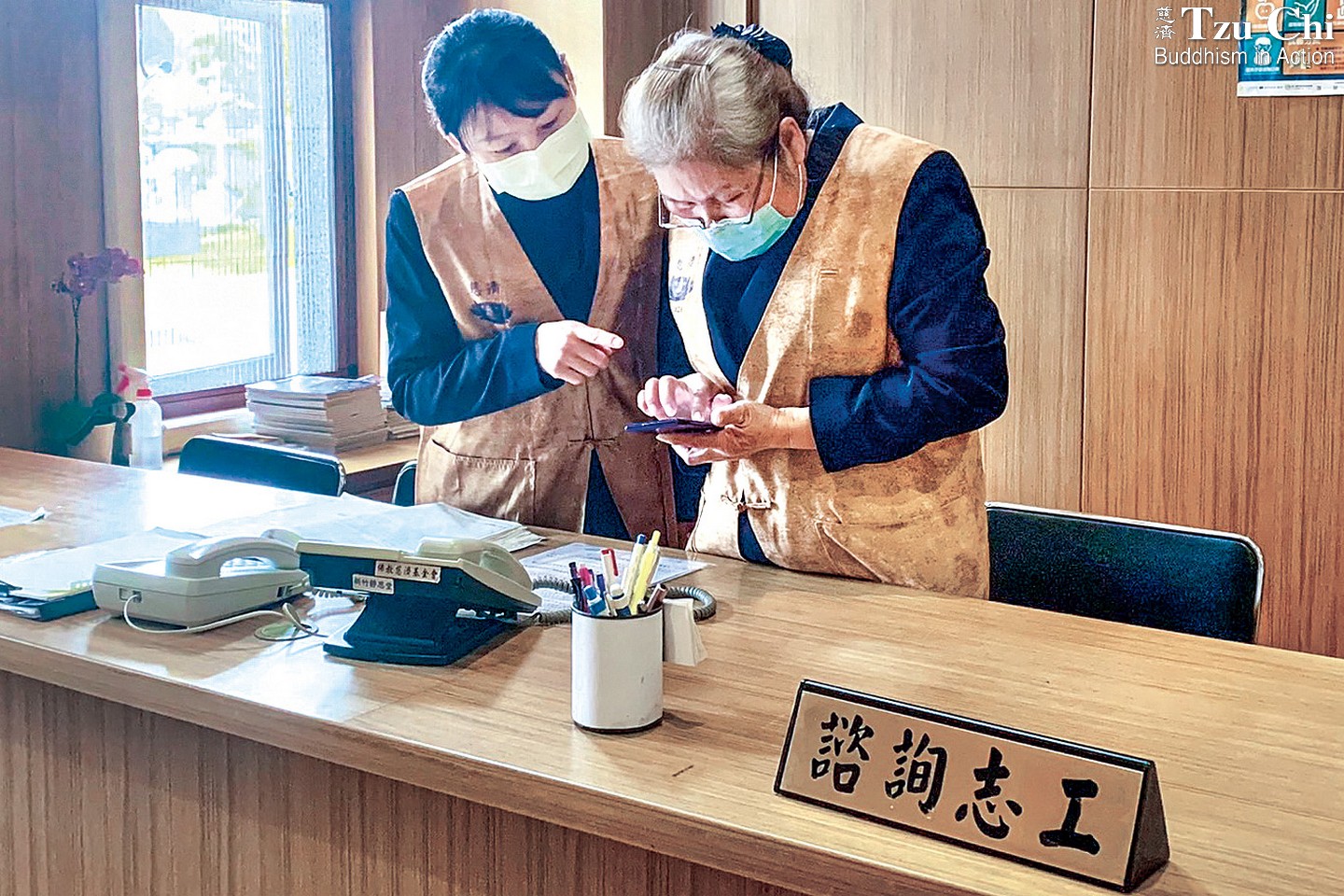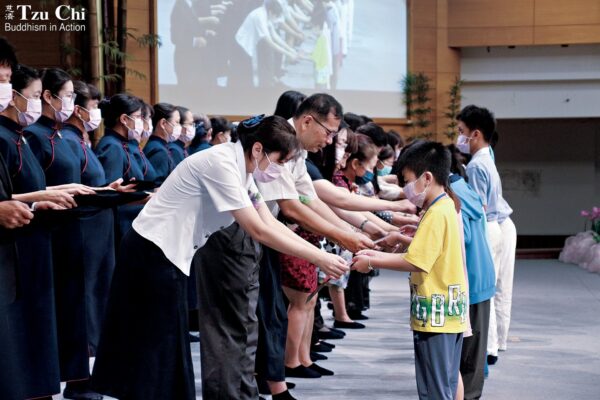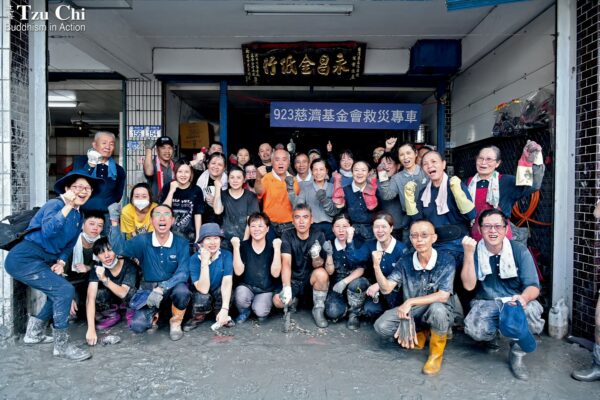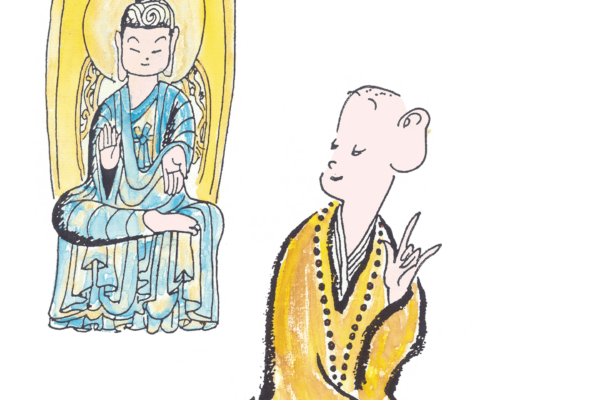By Jian Yu-xian
Translated by Wu Hsiao-ting
Photo by Wang Qiong-wan
A volunteer’s interactions with older volunteers exemplifies the value of human connection and the need to treat every older person with warmth and thoughtfulness. It’s how we would all want to be treated one day.

Jian Yu-xian (簡毓嫻), the author of this article, interacts with an older volunteer as she volunteers at the Hsinchu Jing Si Hall in northern Taiwan.
I serve every Thursday at the information desk at Tzu Chi’s Hsinchu Jing Si Hall in northern Taiwan. One of the benefits of volunteering there is the chance to interact with and get to know volunteers from other districts. We share with each other the stories that led us to join Tzu Chi and the experiences that have shaped our lives.
One day while I was on duty at the information desk, four senior volunteers entered the Jing Si Hall. One of them stood in front of the computer used to sign in volunteers and muttered, “I’ve never learned how to log into this computer.”
I asked her out of curiosity, “How then do you usually sign in?”
“I always ask someone else to enter my information and sign in for me,” she replied.
Her answer sparked my desire to teach her how to log in. I showed her how, then let her repeat the process. When she had learned it, her face lit up with a joyful smile like a child’s. “It’s so easy!” she exclaimed. “I used to be so afraid of doing it wrong and causing the computer to crash!”
She then took out her phone and said, “I don’t know how to use this phone very well either, and I’m a bit scared of messing it up.” She went on to explain, “This is an old phone my son gave me. Sometimes when I can’t figure out how to use it, I ask him for help, but he often gets angry with me, saying, ‘I’ve taught you so many times, and you still don’t know how to use it!’ You can imagine my frustration.” She poured out her heart to me, having found a sympathetic ear in me.
I comforted her by saying, “Don’t worry. With practice, you’ll get better. Let me demonstrate to you some of the phone’s features, and you can try them out whenever you get the chance.”
I escorted her to a seat, asked her to switch on her phone, and started showing her the basic functions of a messaging app on her phone.
The other three volunteers gathered around us and watched me teach. As they listened, they all threw out questions. I answered each of their questions and allowed them to practice repeatedly. They practiced receiving messages, editing photos, and leaving or deleting comments on a social media platform as they clumsily tapped on the phone’s screen. If they made a mistake, they started over.
I provided them with words of encouragement throughout my tutorial session, such as: “It’s okay to make mistakes; a phone won’t break that easily. Practice makes perfect. You’ll master it over time.” These silver-haired seniors were all serious and dedicated learners. It was evident that they were capable of learning, but severely lacked confidence. Faced with constantly evolving technology, they felt lost and often couldn’t find someone to turn to for help. This resulted in growing frustration and a sense of being left behind by the times.
I wasn’t always patient with older people. When I was younger, I’d often get annoyed with my parents when I felt that they were asking me too many questions. Similarly, when they requested that I teach them how to use the Internet, I would impatiently demonstrate, which often made them angry.
My attitude and behavior began to change as I grew older. As my parents aged, I became more aware that one day I would have to say goodbye to them. I began to cherish every moment I could still spend talking to them, knowing that time was running out. I made a conscious effort to speak to them in a gentler tone and treated them with the same patience as I would treat a young child.
I looked upon the four senior volunteers I had met by chance as my own elders. I cherished our encounter. Seeing the smiles on their faces when they realized that they still had the ability to learn, that they were still useful, and that they were being supported and accepted brought me a great sense of accomplishment as well.
The inexorable force of time propels us all forward. Witnessing the gap between the older volunteers and technology made me ponder: What will the world be like when I am older? Will I too be intimidated by the new technology of that time?
As I reflected further, I reminded myself that no matter how much times may change, what truly matters is seizing the present moment and interacting with every older person with warmth and thoughtfulness. For one day, when I too am old, I hope to be treated the same way by the younger generation.
At the end of my teaching session, I transcribed the day’s lesson onto paper and let the volunteers take photos of the notes with their mobile phones so they could continue practicing at home. One of the volunteers said, “Please write your name next to the notes. I want to remember your name.” As she looked at the name I wrote down, she sincerely said to me, “Thank you, Teacher Jian!” The gratitude she showed instantly filled my heart with warmth and touched me deeply.
Teaching and learning: what wonderful gifts they are, helping us to connect with others in such meaningful and enriching ways.



